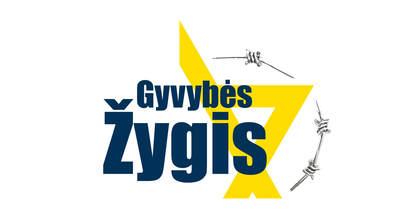March of Life in Lithuania
March of Life is an international movement initiated by a German pastor Jobst Bittner. It seeks to fight modern antisemitism and expresses friendship and support for Israel.
March of Life was first organised in Lithuania on the 22nd-25th of September 2011. The event, which started in Germany and brought reconciliation and restoration among Christians and Jews in many nations, took place on the 22nd-23rd of September 2011 in Kaunas – a city, where the mass killing of Jews started. On the 24th-25th of September it spread to other Lithuanian cities – Vilnius, Panevėžys, Klaipėda, Plungė and nearby villages where mass murder occurred.
During the event, German Christians, who personally acknowledged their family guilt for the mass killings of Jews in Europe in the course of World War II and repented for that, marched in a unified parade. Lithuanians together with Jews, who have survived the Holocaust, and their children from various countries, marched from the massive massacre sites to the central squares of those countries. This was how the memory of those who were killed in the Holocaust was honoured.
March of Life was first organised in Lithuania on the 22nd-25th of September 2011. The event, which started in Germany and brought reconciliation and restoration among Christians and Jews in many nations, took place on the 22nd-23rd of September 2011 in Kaunas – a city, where the mass killing of Jews started. On the 24th-25th of September it spread to other Lithuanian cities – Vilnius, Panevėžys, Klaipėda, Plungė and nearby villages where mass murder occurred.
During the event, German Christians, who personally acknowledged their family guilt for the mass killings of Jews in Europe in the course of World War II and repented for that, marched in a unified parade. Lithuanians together with Jews, who have survived the Holocaust, and their children from various countries, marched from the massive massacre sites to the central squares of those countries. This was how the memory of those who were killed in the Holocaust was honoured.
|
|
|
The Holocaust in Lithuania
Even though the invasion first victimized the countries under German occupation, now they had also become perpetrators. This makes a working through of their past so difficult, even to this day. There still is an unbroken anti-Semitism in many of them that is connected to a lacking willingness to face the dark
side of their own past.
The Holocaust in Eastern Europe
In Eastern Europe, anti-Semitic attitudes are also still rife. It is only very gradually that these governments are starting to face the past. Without wanting to play down the German responsibility for the Holocaust in any way, in recent years there has been an increased focus on the support by local aides and helpers. Hitler’s henchmen had willing helpers in the occupied nations, such as the former Ukrainian concentration camp guard John Demjanjuk, who was found guilty of complicity in murder in a thousand cases. The Germans could never have accomplished the millionfold murder of European Jews by themselves.
Even though the invasion first victimized the countries under German occupation, now they had also become perpetrators. This makes a working through of their past so difficult, even to this day. There still is an unbroken anti-Semitism in many of them that is connected to a lacking willingness to face the dark
side of their own past.
The Holocaust in Eastern Europe
In Eastern Europe, anti-Semitic attitudes are also still rife. It is only very gradually that these governments are starting to face the past. Without wanting to play down the German responsibility for the Holocaust in any way, in recent years there has been an increased focus on the support by local aides and helpers. Hitler’s henchmen had willing helpers in the occupied nations, such as the former Ukrainian concentration camp guard John Demjanjuk, who was found guilty of complicity in murder in a thousand cases. The Germans could never have accomplished the millionfold murder of European Jews by themselves.
80th Anniversary of the Holocaust
In 2021 we will commemorate the 80th Anniversary of the Holocaust. On this occasion, we are planning to organise March of Life events but before that we want to lay the foundation and publish Jobst Bittner’s book "Breaking the veil of Silence" in Lithuanian.
Jobst Bittnerʼs book "Breaking the veil of Silence"
VšĮ „Prabudimo orkestras“ (engl. Revival Orchestra) was granted the permission of the publisher to release Jobst Bittnerʼs book "Breaking the veil of Silence" in Lithuanian. Our fellow Lithuanian Akvilė Weinert, who is living in Germany, has translated this relevant book and the process of editing is now in order. We are planning to release the book in fall 2020.
Today we want to share a few excerpts from the book "Breaking the veil of Silence".
Today we want to share a few excerpts from the book "Breaking the veil of Silence".
Foreword by Dr. Michael L. Brown
|
This is a book that could only have been written by a German pastor and activist with a solid theological background, a deep devotion to the Holy Spirit, and a lifelong commitment to Israel.
Jobst Bittner is such a man. He studied under the late, heralded professor Martin Hengel, famous for his work on Judaism and Hellenism, and so Jobst has a thorough understanding of the Jewish roots of the Christian faith, a subject of foundational importance to this book. And as a pastor who believes in taking the gospel to the streets, he both speaks and acts, putting legs to his faith and bringing a living and public demonstration. He knows that only the power of the Holy Spirit can truly deliver the captives and make the brokenhearted whole. Finally, as a man devoted to Israel and the salvation of the Jewish people, he can assess the painful legacy of the German church, but always with a hopeful eye that looks forward. |
Other German Christian leaders have addressed the veil of silence that hung over the church during the fateful years of the Holocaust, among whom was Basilea (formerly Dr. Klara) Schlink, founder of the Evangelical Sisterhood of Mary.
With anguish of heart she wrote in 1958:
“We Germans were Satan’s henchmen. In the midst of our people this hell was created… We are personally to blame. We all have to admit that if we, the entire Christian community, had stood up as 18 one man and if, after the burning of the synagogues [on Kristallnacht], we had gone out on the streets and voiced our disapproval, rung the church bells, and somehow boycotted the actions of the S.S., the devil’s vassals would probably not have been at such liberty to pursue their evil schemes. But we lacked the ardor of love – love that is never passive, love that cannot bear it when its fellow men are in misery, particularly when they are subjected to such appalling treatment and tortured to death. Indeed, if we had loved God, we would not have endured seeing those houses of God set ablaze; and holy, divine wrath would have filled our souls.”
(Israel, My Chosen People: A German Confession Before God and the Jews (Eng. trans., Old Tappan, NJ: Chosen, 1987), 39, 42-43)
But this is 2011, not 1958, and Pastor Jobst contends that the veil of silence – a multifaceted veil of silence – remains over the older and younger generations, and this veil must be torn down by identificational repentance and a positive, public witness.
In response, a sincere critic might ask, “Are we to endlessly repent of the sins of past generations? And is it even our place to do so?” Those are certainly worthy questions, and in my opinion, this kind of repentance is called for when: 1) The wounds of the past sins remain, which is certainly the case with regard to the subject matter of this book; and 2) The seeds of the past sins remain, and this too cannot be denied today.
And yet this is certainly not just another book about German Christians and the Holocaust. Certainly not. It is a call to dig deeper, to uproot every destructive and hurtful remnant that remains, and to move forward into wholeness, freedom, and life. And it brings a very specific call to a very literal March of Life, exalting Jesus and displaying what it really means to be one of His disciples.
As a Jewish follower of Jesus, myself indebted to Gentile Christians who introduced me to Israel’s Messiah and Lord forty years ago, I commend this book to you.
Dr. Michael L. Brown
With anguish of heart she wrote in 1958:
“We Germans were Satan’s henchmen. In the midst of our people this hell was created… We are personally to blame. We all have to admit that if we, the entire Christian community, had stood up as 18 one man and if, after the burning of the synagogues [on Kristallnacht], we had gone out on the streets and voiced our disapproval, rung the church bells, and somehow boycotted the actions of the S.S., the devil’s vassals would probably not have been at such liberty to pursue their evil schemes. But we lacked the ardor of love – love that is never passive, love that cannot bear it when its fellow men are in misery, particularly when they are subjected to such appalling treatment and tortured to death. Indeed, if we had loved God, we would not have endured seeing those houses of God set ablaze; and holy, divine wrath would have filled our souls.”
(Israel, My Chosen People: A German Confession Before God and the Jews (Eng. trans., Old Tappan, NJ: Chosen, 1987), 39, 42-43)
But this is 2011, not 1958, and Pastor Jobst contends that the veil of silence – a multifaceted veil of silence – remains over the older and younger generations, and this veil must be torn down by identificational repentance and a positive, public witness.
In response, a sincere critic might ask, “Are we to endlessly repent of the sins of past generations? And is it even our place to do so?” Those are certainly worthy questions, and in my opinion, this kind of repentance is called for when: 1) The wounds of the past sins remain, which is certainly the case with regard to the subject matter of this book; and 2) The seeds of the past sins remain, and this too cannot be denied today.
And yet this is certainly not just another book about German Christians and the Holocaust. Certainly not. It is a call to dig deeper, to uproot every destructive and hurtful remnant that remains, and to move forward into wholeness, freedom, and life. And it brings a very specific call to a very literal March of Life, exalting Jesus and displaying what it really means to be one of His disciples.
As a Jewish follower of Jesus, myself indebted to Gentile Christians who introduced me to Israel’s Messiah and Lord forty years ago, I commend this book to you.
Dr. Michael L. Brown
Donation
You can send donation via PayPal:
Or you can send donation via Bank Transfer:
VšĮ „Prabudimo orkestras“
Company code: 304559381,
AB bankas „Swedbank“, SWIFT: HABALT22
IBAN: LT987300010162329053
Purpose: Donation for Jobst Bittner book "Breaking the veil of Silence" translation and publishing in Lithuanian language



